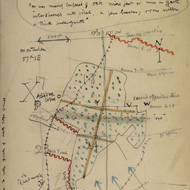The David Jones Collection
‘...and Mr Jenkins takes them over / and don't bunch on the left / for Christ's sake.’
In Parenthesis Part VII (the moment of 'going over the top' during the Battle of the Somme).
on this page

Biography
David Jones (1895–1974)
David Jones was born on 1 November 1895 in Brockley, Kent, the son of James Jones, a printer from Flintshire and his wife Alice, from Rotherhithe, Surrey. He served as a private during the First World War and some twenty years later In Parenthesis, his epic poem recalling those experiences, was published.

In Parenthesis is full of Biblical, early English and Welsh literary allusions, and the sources are many and varied. David’s father, although from a Welsh-speaking family, had been encouraged from an early age to speak English 'to get on in life'. He did, however, sing Welsh songs, and that, and family visits to north Wales, stimulated David's interest in the Welsh language and Welsh mythology. His parents were Church of England but were dismayed by his growing fascination for 'high church' rituals and his conversion to Roman Catholicism in 1921. They did, however, support his precocious artistic talents and his desire to enter Camberwell School of Art, which he attended from 1910 to 1914.
When war was declared in the summer of 1914, Jones tried to join the Artists' Rifles (but was rejected because of insufficient chest expansion). He managed to enlist in the newly formed 15th (London Welsh) Battalion of the Royal Welch Fusiliers on 2 January 1915. The Battalion was raised from Welshmen living in London, and native Londoners.
After training in London, north Wales and Winchester (Salisbury Plain), much hampered by a lack of equipment, Jones' Battalion embarked for France in December 1915 as part of the 38th (Welsh) Division. After a period in the Front Line (around the La Bassée sector) Jones' Battalion moved to the Somme in the summer of 1916. During the attack on Mametz Wood on the 10-11 July he was wounded and was subsequently returned to England to convalesce. In the autumn of 1916 he served as an observer with the 2nd Field Survey Company at Ploegsteert Wood. Sketches from Jones' time here survive, which like others from his service, concentrate on the mundane - equipment, buildings and comrades he served with. On his eventual return to the Line, Jones saw action again on the Ypres salient at Bosinghe, Pilkem Ridge, Langemark and Passchendaele. Suffering from severe trench fever, Jones was evacuated in February 1918 and saw out the rest of the war in Ireland.
The title of his poem In Parenthesis, (meaning between brackets), encapsulates Jones' view of the War - not the ordeal that defined his whole life but an aside. Jones served as a private on the Western Front. He was not an official war-artist, and was never a 'soldier poet'. He appears to have enjoyed the comradeship and sense of purpose of soldiering. The War inspired his art throughout his life, and he felt keenly the loss of a close friend, Reg Allen, (referred to as Pte R.A., Lewis-gunner in the dedication to In Parenthesis) and many comrades killed or wounded.
Although apparently not a bad soldier Jones described himself in the preface to In Parenthesis as an 'amateur… grotesquely incompetent, a knocker-over of piles, a parade's despair' ('piles' were many rifles propped-up together). In January 1919 as he was about to report to be de-mobbed in Dublin, his rifle was stolen when he went to a public toilet. He was able to swipe a rifle from a pile of arms already handed-in otherwise he would have suffered some dire punishment. Jones confided this story to a friend in his later life but expected the authorities to call him to account even fifty years later!
After the war his reputation as an artist and writer grew. On demobilisation he studied at Westminster School of Art (1919-1921). Jones' artwork later won him high regard among the artists of his generation. He was elected to the Seven and Five Society and exhibited with Ben Nicholson, Barbara Hepworth, Henry Moore, and John Piper.
Jones' work as a poet was as impressive as his paintings and sculpture, and in the lettering and the texts of his 'inscriptions', (words painted on paper), he devised a new and emotive art. His work was interrupted by severe breakdowns in 1932-1933 and 1947. After 1947 he lived in Harrow. Jones was appointed CBE in 1955 and a Companion of Honour in 1974. He won many prizes and awards including the Gold Medal of the Royal National Eisteddfod (1962), and received the honorary degree of Doctor of Literature from the University of Wales in 1960. His long notes and his letters (such as those written to Colin Hughes about his experiences of the war) were annotated (usually in red and green). According to Peter Levy 'Jones had a boyish gaiety and a charmingly wide smile. His conversation was full of humour and inventive parody; his sympathy and the range of his interest were extraordinarily wide. The fulcrum of his morality was the decency of the infantrymen of 1914. Under stress he would drop his shopping, lose his papers, or find himself smoking two cigarettes, one in each hand... He concentrated on a friend, on a subject of conversation, on a detail of any kind, historical or technical or visual or intellectual, with uncommon intensity. His eyes twinkled and glittered deeply.'
David Jones died at the Calvary Nursing Home, Sudbury Hill, Harrow, on 28 October 1974, after years of ill health. He is buried with his parents in Ladywell Cemetery in south-east London.
| Author | Alun Edwards and Colin Hughes |
|---|---|
| Sources |
|
Search the David Jones Collection
Drafts of In Parenthesis (Part VII)
Find other items
- Correspondence from David Jones
- Correspondence to David Jones
- Photographs of David Jones
- Art work by David Jones
- Official documents (e.g. service records) relating to David Jones
- Archival Holdings:


